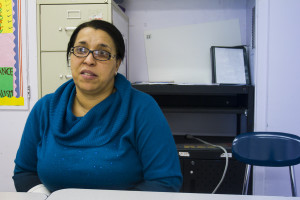
A school aide at Bronx International Community High School was skimming through student absence records four years ago when she noticed something alarming.
Two Yemeni sisters were absent.
Her call to the family confirmed her fears. “They took them to Yemen for marriage,” said Nassira Hamdi, who had seen this phenomenon before.
The girls were bright students. Both were making plans to apply for college. The oldest had just turned 19, “which is like 50 to them,” Hamdi said. The younger sister was next in line for marriage and had stopped attending as well. “This is not what they wanted.”
Several years ago, the teachers at ICHS began noticing that Yemeni girls would eventually leave the school without warning. The International School in the Bronx belongs to the International Network of Public Schools, which serves immigrant students from about 120 countries, including the Dominican Republic, Honduras, Puerto Rico and a relatively small number from Yemen.
Between 2010 and 2014, the school enrolled between four and nine Yemeni students each year, for a total of about 40 students in four years. By 2014, only 12 of them had reached the 12th grade, and only 10 graduated high school. In four years, only two Yemeni girls received a high school diploma.
The phenomenon was noticeable among 11th and 12th-graders. “That’s the age that the parents take them to get married,” said Hugo Lanchipa, English as Second Language coordinator at ICHS. He said the school had been working with families to try and convince them to delay returning to Yemen until after graduation. They had been having limited success. The situation has grown more urgent in the minds of school officials since Yemen has erupted into violent turmoil. The recent suicide bombings that resulted in over 150 deaths in country’s capital Sanaa are a yet another demonstration of the brutal chaos of the conflict that is bordering on civil war.
The best estimate from the U.S. Census Bureau is that currently Yemeni immigrants comprise only 0.1 percent of New York’s population. Still, the city has one of the highest concentrations of Yemenis in the U.S. Between 2009 and 2013 the number of immigrants born in Yemen and living in New York was estimated at 11,000. The limited data from the Census Bureau suggests that the number of Yemenis remained relatively stable during those years.
For Hamdi, the heartbreak of the Yemeni sisters is one she has witnessed over and over again at the South Bronx school. Once the students are back in Yemen, Hamdi said, education is most commonly not the first thing on their mind, given the country’s political strife and economic stagnation. Hamdi’s job is to facilitate learning for students whose first language is French or Arabic and who are not proficient in English. She mostly works with Yemeni and West African students.
The students, who attend only religious schools in their home country, often have minimal literacy in their native language when they get to the U.S. ICHS data suggests that Yemeni students require on average five to six years to graduate. This often means that by the time the female students get accustomed to the school, the language and subjects, many families decide to stop their education and send them into arranged marriages in Yemen.

Hamdi, a native of Morocco, tries to reason with the families by speaking to them as a fellow Muslim. “I always tell them, I am a Muslim, but my family let me finish school,” Hamdi recounts telling to families. Having at least a high school diploma, she said, would bring status and prestige to the whole family. These arguments turned out more successful among West African families than Yemeni ones.
Marrying off girls when they are teenagers is common practice in Yemeni culture. Yousef Assabahi, vice president of California-based American Association of Yemeni Students and Professionals, divides Yemeni families into two categories: the fundamentalists and the moderates. The latter, he said, value education and support their children through college. Fundamentalists tend to pull girls out of school even before elementary school is over.
“I heard so many stories in regards to girls leaving school and it’s certainly happening,” said Assabahi. “The reason for that can be marriage or the conviction that girls were meant to be housewives.” Assabahi said that the Association reaches out to students who face challenges at school by networking, organizing conferences and connecting them to resources. He is optimistic about the future. “Yemeni community is in an awakening period. We are working hard to spread awareness of the importance of education.”
At International Community High School in the Bronx there are currently 15 Yemeni students out of the total 437.
One 17-year-old Yemeni 11th grade girl, whose family immigrated five years earlier, said her dream was to become a pediatrician. A black and white hijab lined with sequins around her face gracefully wraps her head and neck and drops down to her waist. She carefully chose each word. She asked that her name not be used, because sharing her personal life ran contrary to her culture.
Adjusting to the U.S. was difficult at first, she said, fidgeting with her rings as she groped for the right word. “I was sad to move,” she remembered about leaving Yemen. “That’s my country, that’s my heart. I felt like I will get out of my body if I leave.”
Once in the U.S. she enrolled in middle school at the same time her older sister enrolled in International Community High School. By the time her sister reached the 12th grade, her family had sent her back to Yemen to be married “My sister now has two babies,” she said. “I don’t think she is coming back to school.”
Most Yemeni girls don’t have a career, she explained. They believe that a woman needs to stay at home. But education has come to mean something more valuable to the 17-year-old. Her family now supports her studies and wants her to apply to college. In her opinion, women should have opportunities to study and work, but they need to remain devoted to their families. “If they [her family] decide, I will go back to Yemen.” That’s increasingly unlikely, given the current unstable political conditions in Yemen.
In 2010, another Yemeni teenager moved to the U.S. with her family. Areeg Alibali, 17, is a senior at Abraham Lincoln High School in Brooklyn. This large school on Ocean Parkway hosts more than 2,300 students from various backgrounds. Albali is one of a few hundred Yemeni students at the high school.
Just like the Yemeni girl from the South Bronx school, Alibali wore a black hijab, with sequins on the edges. Over it, she had on a large grey hoodie. She spoke with the eloquence of every American teenager, and only at times her words did not catch up with the flow of her thoughts.
Her family, Alibali said, moved to New York for a better life. When she first arrived to the city, she spoke no English. “I didn’t know how to say ‘hi’; I didn’t know how to say my name,” she recalled. In her final year of high school, she managed to not only perfect her English, but also maintain high grades and enroll in extracurricular activities, such as promoting healthy food at school and tutoring earth science to her peers.
The issue of early marriage is close to Alibali’s family: her oldest sister also got married and did not graduate high school, while her cousins had to drop out of college. Her father, however, encourages education: “What if your husband can’t support you? With education you can find any job. My dad always says that.” What if her family asked her to get married now? “I wouldn’t go against my family.”
Alibali said that in her culture getting married as a teenager happens every day, regardless of the country of origin. “I knew a girl born in U.S. from Lincoln high school, she didn’t finish high school,” she said. “The family sticks to the culture.”
Boys from Yemeni families face different challenges at school. The majority of students from Arabic countries at the Bronx school are boys, said Lanchipa. Once they reach 18, the family begins to push them into work rather than college. School officials try to intervene, but still, too often Yemeni boys fall asleep in classrooms, exhausted after working the night before.
“Some students also come here for fun,” Hamdi explained, since those boys “do not get much fun outside of school.”
Yemeni students are not the only ones who face cultural challenges at school. At ICHS, for example, the West African female students also tend to get married while in high school. But the difference is that girls continue to come to school after their children are born. ICHS provides daycare services for the children.
Since 2009, the International high school began partnering with Sauti Yetu, a community-based organization that works with African immigrant women in New York City. Sauti Yetu’s “Girls Empowerment and Leadership program” has been a success at ICHS, according to Lanchipa. The program works closely with students to ease the transition to the U.S., to help them and their families approach issues such as early marriage, provide support to married youth and connect them to resources needed to address challenges in their day-to-day lives. The organization holds regular meetings with students and their families both inside and outside of school. As the cooperation develops, according to Lanchipa, more and more West African girls are getting their diplomas on time.
For now, ICHS does not have a similar partnership model for its Yemeni female students. Lack of resources and small Yemeni population may both be the reasons, the school staff said. Yemeni girls are left to rely on faculty and staff of their school, which is always there for them. “These teenage kids are our future,” Hamdi said. “I tell my kids, your job is to go to school. Everybody will help you, I will help you. Just come to us.”



